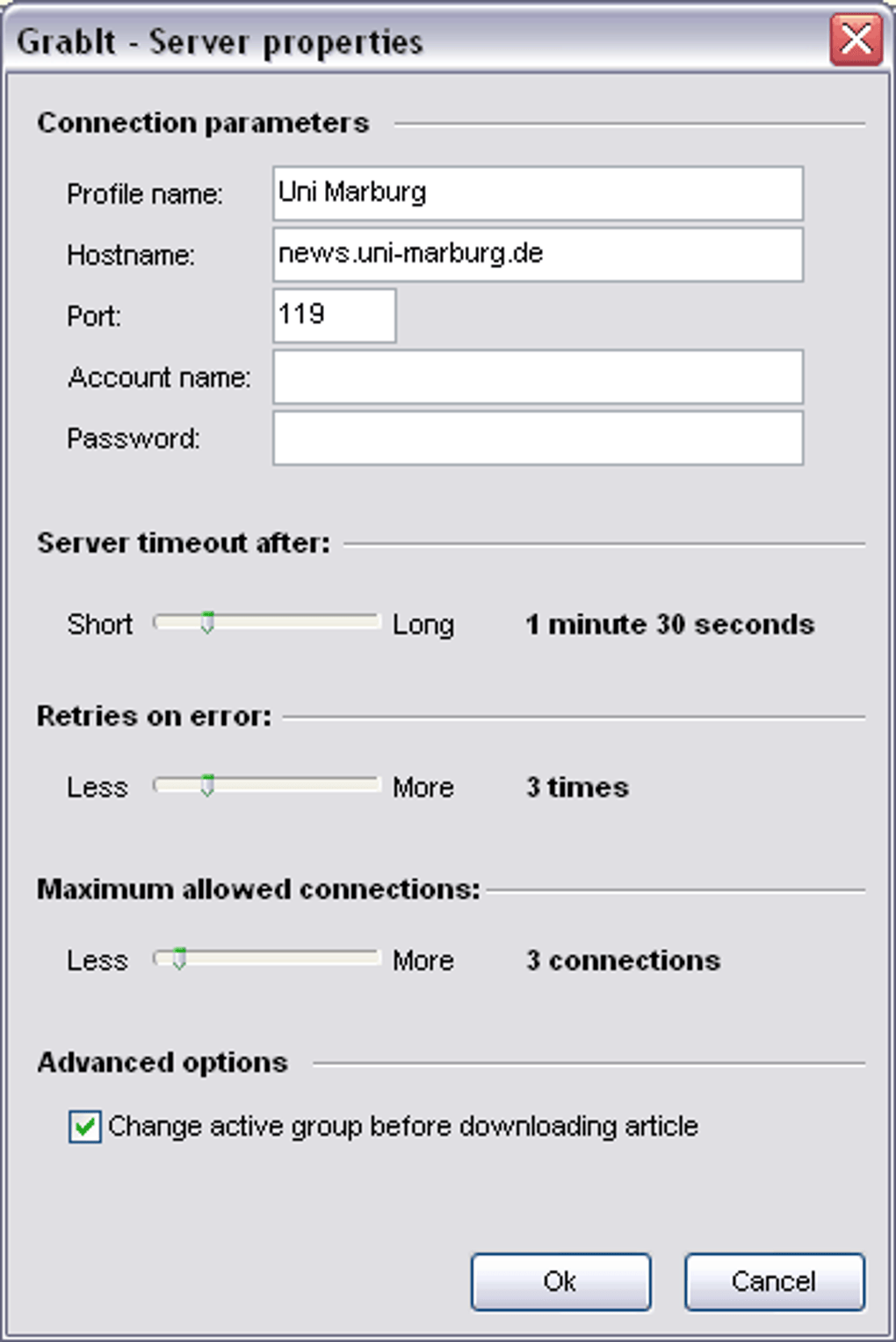
The WriteBuffer is especially important if the article cache is disabled. If you have little memory set it to 32 or something or more depending on the amount of connections. If DirectWrite is disabled the article cache should be big enough to accommodate any whole rar-file (up to 1 GB). If option DirectWrite is active (see below) the article cache can be set to 200 (MB). This is especially important if you use many connections (10 or more). Article cacheĪrticle cache greatly decreases the file fragmentation which improves the unpack speed.

Configure the RAM usage according to your system.
News server grabit download#
NZBGet is designed to use as little memory as possible but it can use more RAM if available to speed up the download and post-processing. Use remote client for short periods of time needed for controlling of download process on server. To avoid this you should run NZBGet in daemon (POSIX) or service (Windows) mode. In this case the screen is constantly updated. You can run NZBGet in console in server mode using command “nzbget -s”.

On a desktop computer with CPU you may not notice any difference but on a slow NAS the option can decrease download speed two or three times! Daemon mode If you need an accurate speed indication you should definitely test how it affect your download speed. Option AccurateRate (when active) can significantly decrease performance because a lot of synchronization between download threads is required. For better performance do not limit download speed (option DownloadRate) Accurate speed rate If the download speed limit is active the program needs additional work to respect the limit. Activate option UnpackPauseQueue to avoid simultaneous download and unpack. If you get a very damaged download you can copy files to a fast desktop computer and repair there.Īctivate option ParRename to handle with obfuscated (intentionally misnamed) files. Set a time limit for par repair using option ParTimeLimit. If the download is very damaged it may take a lot of time (hours or even days) to repair it.
News server grabit free#
Increase the option ParBuffer if you have enough free memory.Īctivate option ParPauseQueue to avoid simultaneous download and par check. If your device has more than one CPU core set the option ParThreads accordingly. The option ParQuick must be activated for fast par-verification (if par-repair is needed). Make sure the option ParScan is set to auto to optimize the scan speed. If the download is damaged it will be par-checked and -repaired.
News server grabit full#
The downside of disable CrcCheck is that the quick par-verification may become less reliable which may result in a full verification sometimes. If you have a good reliable news server you can disable CRC check using option CrcCheck. The CRC computation however requires CPU time. CRC checkĬRC-check ensures the downloaded articles are correct. More connections means more threads and this can make your device less responsive.įor fill servers ( ServerX.Level>0) define the same number of connections as for main servers, if possible. With option ServerX.Connections you define the number of simultaneous connection.įor main servers ( ServerX.Level=0) use as little connections as possible to saturate your internet link. See Choosing cipher for a more detailed explanation. Choosing a faster cipher can significantly boost performance. Use option ServerX.Cipher to fine tune the TLS/SSL. Encrypted communicationĪctivating the encrypted communication with news server (option ServerX.Encryption) makes a huge impact on performance. Check the following configuration options. CPU as a limiting factorĬPU is always a limiting factor on mentioned devices.

NOTE: This guide is written for version 14.0 and later. you should take your time to configure NZBGet for best performance. If you use NZBGet on a computer with limited capabilities, such as NAS, media player, router, etc. There are many configuration options affecting performance. NZBGet tries to overcome the limitations by using different techniques. NZBGet is designed to work smooth on computers with little resources.


 0 kommentar(er)
0 kommentar(er)
